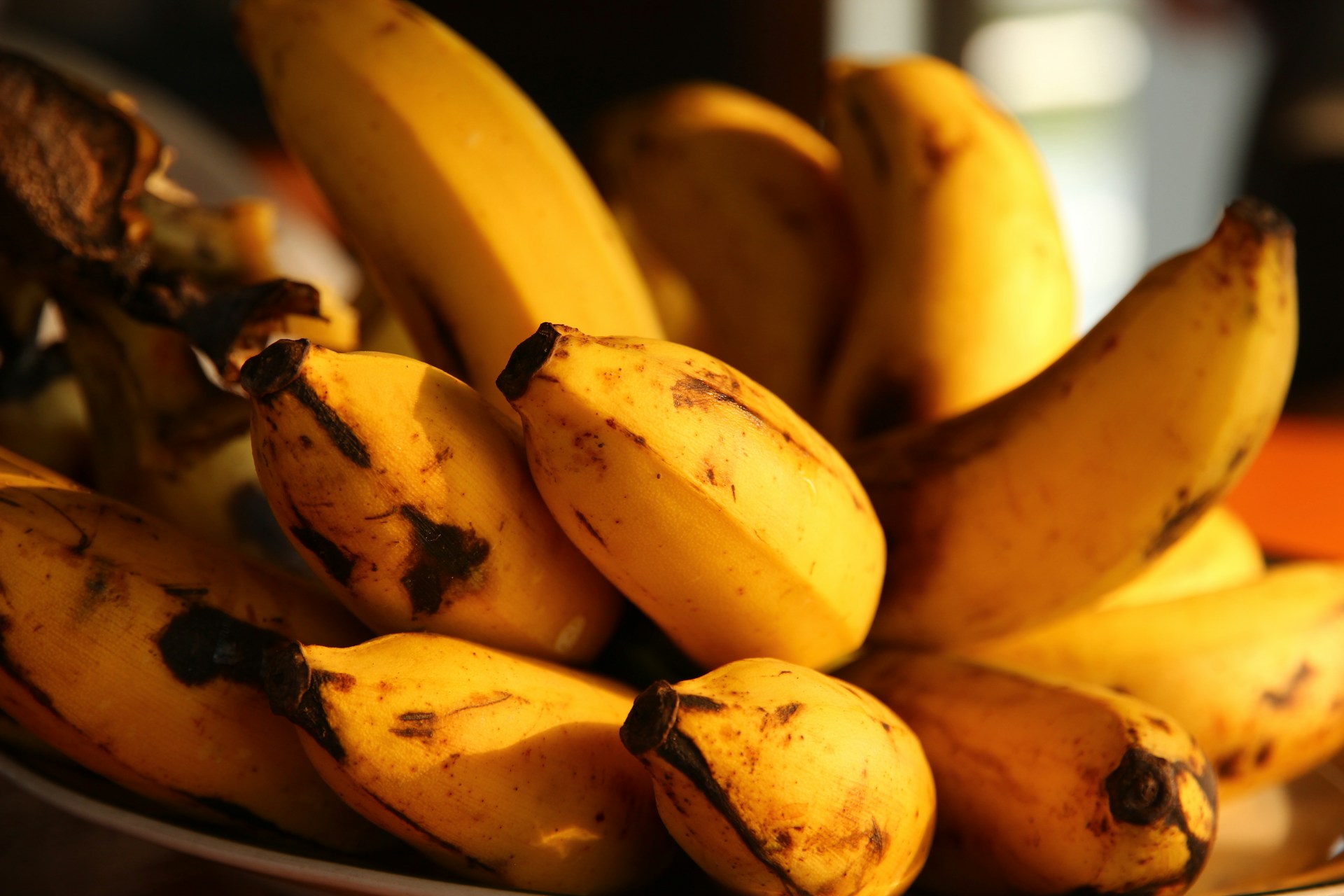Protective Effect of Banana, Cassava, and Corn Flours on Hepatotoxicity of Malnourished Male Rats
Efek Protektif Tepung Pisang, Singkong dan Jagung terhadap Hepatotoksisitas Tikus Jantan Malnutrisi

Downloads
Background: Malnutrition-induced hepatotoxicity is defined as liver damage caused by insufficient nutrition, which results in oxidative stress and damage to liver cells.
Objectives: The present study aimed to investigate the protective effects of banana, cassava, and corn flours on hepatotoxicity induced by malnutrition in male rats.
Methods: Twenty-four male rats were divided into six groups (n=4): (1) rats received 30 g/rat normal feed daily for 45 days; (2) rats received 30 g malnutrition feed daily for 45 days; rats received 30 g/rat malnutrition feed daily for 15 days and then treated with normal feed (3), banana flour (4), cassava flour (5), and corn flour (6), for 30 days. The malnutrition groups received a diet with protein deficiency for 15 days, then were treated with a diet according to each treatment group. The liver enzymes were analyzed, including aspartate aminotransferase (AST) and alanine aminotransferase (ALT) levels. Furthermore, the liver's histopathological changes in each group were evaluated using Hematoxylin eosin staining.
Results: The AST levels in malnourished male rats significantly (p<0.05) increased (240.75±67.23 U/L) compared to the control group (170.00±33.52 U/L). While, the ALT levels (66.75±12.69 U/L) were decreased compared to the control group (98.75±26.61 U/L). Furthermore, malnutrition diet in rats caused significant changes in liver histology, including inflammatory cell infiltration, necrosis, congestion of the central vein, cytoplasmic vacuolization, and widened hepatic sinusoid. Interestingly, normalized AST and ALT levels and improved liver histology were observed in malnourished rats after receiving normal feed and flour of banana, cassava, and corn.
Conclusions: Banana, cassava, and corn flours exhibited hepatoprotective activity on malnutrition-induced hepatotoxicity in malnourhised male rats.
Hastreiter, A. A. et al. Effects of protein malnutrition on hematopoietic regulatory activity of bone marrow mesenchymal stem cells. J. Nutr. Biochem. 93, (2021).
Ramadan, W. S., Alshiraihi, I. & Al-karim, S. Effect of maternal low protein diet during pregnancy on the fetal liver of rats. Ann. Anat. 195, 68–76 (2013).
Saha, Mehndiratta, M., Aaradhana, Shah, D. & Gupta, P. Oxidative Stress, Mitochondrial Dysfunction, and Premature Ageing in Severe Acute Malnutrition in Under-Five Children. Indian J. Pediatr. 89, 558–562 (2022).
Parenti, M., McClorry, S., Maga, E. A. & Slupsky, C. M. Metabolomic changes in severe acute malnutrition suggest hepatic oxidative stress: a secondary analysis. Nutr. Res. 91, 44–56 (2021).
Hernández-Aquino, E. & Muriel, P. Beneficial effects of naringenin in liver diseases: Molecular mechanisms. World J. Gastroenterol. 24, 1679–1707 (2018).
Ariyaratna, S. R., Kulathunga, R. D. H. & Mendis, B. J. Effect of Unmadagajakesari rasa on biochemical parameters of patients with Kaphaja unmada ( Major Depressive Disorder ). 05, 373–377 (2020).
Oyagbemi, A. A. & Odetola, A. A. Hepatoprotective and nephroprotective effects of Cnidoscolus aconitifolius in protein energy malnutrition induced liver and kidney damage. Pharmacognosy Res. 5, 260–264 (2013).
Guo, Q. et al. Oxidative stress, nutritional antioxidants and beyond. Sci. China Life Sci. 63, 866–874 (2020).
Singh, Kaur, A., Shevkani, K. & Singh, N. Influence of jambolan (Syzygium cumini) and xanthan gum incorporation on the physicochemical, antioxidant and sensory properties of gluten-free eggless rice muffins. Int. J. Food Sci. Technol. 50, 1190–1197 (2015).
Singh, B., Singh, J. P., Kaur, A. & Singh, N. Bioactive compounds in banana and their associated health benefits - A review. Food Chem. 206, 1–11 (2016).
Sarma, P. P., Gurumayum, N., Verma, A. K. & Devi, R. A pharmacological perspective of banana: Implications relating to therapeutic benefits and molecular docking. Food Funct. 12, 4749–4767 (2021).
Azzam, S. M. et al. Revealing how phenytoin triggers liver damage and the potential protective effects of Balanites Aegyptiaca fruit extracts: Exploring Nrf2/MAPK/ Beclin-1 signaling pathways. Biomed. Pharmacother. 165, 115265 (2023).
Sianipar, E. A., Solang, J. A. N., Nurcahyanti, A. D. R. & Septama, A. W. Hepatoprotective and toxicological evaluation of tropical Sargassum polycystum C. Agardh collected from Sumbawa coast Indonesia, against carbon tetrachloride-induced liver damage in rats. Pak. J. Pharm. Sci. 36, 477–482 (2023).
Morales, E. M., Domingos, R. N. & Angelis, D. F. Improvement of Protein Bioavailability by Solid-State Fermentation of Babassu Mesocarp Flour and Cassava Leaves. Waste and Biomass Valorization 9, 581–590 (2018).
Ayele, H. H., Latif, S., Bruins, M. E. & Müller, J. Partitioning of proteins and anti-nutrients in cassava (manihot esculenta crantz) leaf processing fractions after mechanical extraction and ultrafiltration. Foods 10, (2021).
Luo, X. et al. Integrative analysis of metabolome and transcriptome reveals the mechanism of color formation in cassava (Manihot esculenta Crantz) leaves. Front. Plant Sci. 14, 1–12 (2023).
Medoua, G. N. et al. Recovery rate of children with moderate acute malnutrition treated with ready-to-use supplementary food (RUSF) or improved corn-soya blend (CSB+): A randomized controlled trial. Public Health Nutr. 19, 363–370 (2016).
Winarti, C. et al. Nutrient Composition of Indonesian Specialty Cereals: Rice, Corn, and Sorghum as Alternatives to Combat Malnutrition. Prev. Nutr. Food Sci. 28, 471–482 (2023).
Biljon, A. Van & Labuschagne, M. Multinutrient Biofortification of Maize ( Zea mays L.) in Africa: Current Status, Opportunities and Limitations. 1–24 (2021).
Yu, X. et al. Preparation and identification of a novel peptide with high antioxidant activity from corn gluten meal. Food Chemistry vol. 424 at https://doi.org/10.1016/j.foodchem.2023.136389 (2023).
Yazew, T. Therapeutic Food Development from Maize Grains, Pulses, and Cooking Banana Fruits for the Prevention of Severe Acute Malnutrition. Sci. World J. 2022, (2022).
Gehrig, J. L. et al. Effects of microbiota-directed foods in gnotobiotic animals and undernourished children. Science (80-. ). 365, (2019).
Rakhmawati, Y., Lestari, S. R., Pratama, A. W. & Sulistiyowati, N. Nutrition Facts Analysis of Agung Banana Flour During Ripening. Proc. 3rd Int. Sci. Meet. Public Heal. Sport. (ISMOPHS 2021) 44, 45–49 (2022).
de Oliveira, D. C. et al. The effects of protein malnutrition on the TNF-RI and NF-κB expression via the TNF-α signaling pathway. Cytokine 69, 218–225 (2014).
Jansson, N., Spencer, N. J., Dickson, E. J., Hennig, G. W. & Smith, T. K. Down-regulation of placental transport of amino acids precedes the development of intrauterine growth restriction in rats fed a low protein diet. J. Physiol. 576, 519–531 (2006).
Mai-siyama, I. B., Isyaku, M. U., Atiku, I. A., Muhammad, A. S. & Onazi, H. U. The effect of starvation on blood parameters, electrolytes and liver enzymes in albino rats. Dutse J. Pure Appl. Sci 3, 421–427 (2017).
Harris, R. H., Sasson, G. & Mehler, P. S. Elevation of liver function tests in severe anorexianervosa. Int. J. Eat. Disord. 46, 369–374 (2013).
Wojciak, R. W. Alterations of selected iron management parameters and activity in food-restricted female Wistar rats (animal anorexia models). Eat. Weight Disord. 19, 61–68 (2014).
Vivian, G. K. et al. The interaction between aging and protein malnutrition modulates peritoneal macrophage function: An experimental study in male mice. Exp. Gerontol. 171, (2023).
Santos, M. J. S. et al. A Brazilian regional basic diet-induced chronic malnutrition drives liver inflammation with higher apoa-i activity in C57BL6J mice. Brazilian J. Med. Biol. Res. 53, 1–9 (2020).
Saito, Y., Okumura, Y., Nagashima, K. & Fukamachi, D. Low alanine aminotransferase levels are independently associated with mortality risk in patients with atrial fibrillation. Sci. Rep. 1–8 (2022) doi:10.1038/s41598-022-16435-5.
Preuss, H. G., Kaats, G. R., Mrvichin, N., Bagchi, D. & Preuss, J. M. Circulating ALT Levels in Healthy Volunteers Over Life-Span: Assessing Aging Paradox and Nutritional Implications. J. Am. Coll. Nutr. 38, 661–669 (2019).
Ambrosy, A. P., Dunn, T. P. & Heidenreich, P. A. Effect of Minor Liver Function Test Abnormalities and Values Within the Normal Range on Survival in Heart Failure. Am. J. Cardiol. 115, 938–941 (2015).
Maeda, D. et al. Relation of Aspartate Aminotransferase to Alanine Aminotransferase Ratio to Nutritional Status and Prognosis in Patients With Acute Heart Failure. Am. J. Cardiol. 139, 64–70 (2021).
Vespasiani-Gentilucci, U. et al. Low Alanine Aminotransferase Levels in the Elderly Population: Frailty, Disability, Sarcopenia, and Reduced Survival. Journals Gerontol. - Ser. A Biol. Sci. Med. Sci. 73, 925–930 (2018).
Cornide-Petronio, M. E., Álvarez-Mercado, A. I., Jiménez-Castro, M. B. & Peralta, C. Current knowledge about the effect of nutritional status, supplemented nutrition diet, and gut microbiota on hepatic ischemia-reperfusion and regeneration in liver surgery. 1–24 (2020).
Narayanan, V., Gaudiani, J. L., Harris, R. H. & Mehler, P. S. Liver function test abnormalities in anorexia nervosa - Cause or effect. Int. J. Eat. Disord. 43, 378–381 (2010).
Dinesh, K., Jayaseelan, T., Senthil, J. & Mani, P. Evaluation of hepatoprotective and antioxidant activity of Avicennia alba (Blume) on Paracetamol-induced hepatotoxicity in rats. Innov J Ayruvedic Sci; 419-22. 4, 7–10 (2016).
Chabuk, H. A. H. Dysfunctions of liver and behavioural disorders of females rats suffering from malnutrition: Physiological and histological information as a model of animal anorexia nervosa disease. J. Appl. Nat. Sci. 14, 954–962 (2022).
Bæk, O. et al. Malnutrition Predisposes to Endotoxin-Induced Edema and Impaired Inflammatory Response in Parenterally Fed Piglets. J. Parenter. Enter. Nutr. 44, 668–676 (2020).
Cui, J. et al. 4-tert-butylphenol triggers common carp hepatocytes ferroptosis via oxidative stress, iron overload, SLC7A11/GSH/GPX4 axis, and ATF4/HSPA5/GPX4 axis. Ecotoxicol. Environ. Saf. 242, 113944 (2022).
Rosen, E., Bakshi, N., Watters, A., Rosen, H. R. & Mehler, P. S. Hepatic Complications of Anorexia Nervosa. Dig. Dis. Sci. 62, 2977–2981 (2017).
Mojahed, L. S., Saeb, M., Mohammadi, M. M. & Nazifi, S. Short period starvation in rat: The effect of Aloe vera gel extract on oxidative stress status ion. Istanbul Univ. Vet. Fak. Derg. 43, 32–38 (2017).
Valko, M., Rhodes, C. J., Moncol, J., Izakovic, M. & Mazur, M. Free radicals, metals and antioxidants in oxidative stress-induced cancer. Chem. Biol. Interact. 160, 1–40 (2006).
Yuan, R. et al. Protective effect of acidic polysaccharide from Schisandra chinensis on acute ethanol-induced liver injury through reducing CYP2E1-dependent oxidative stress. Biomed. Pharmacother. 99, 537–542 (2018).
Uyar, S. et al. Could insulin and hemoglobin A1c levels be predictors of hunger-related malnutrition/undernutrition without disease? Clin. Lab. 64, 1635–1640 (2018).
Cappelli, A. P. G. et al. Reduced glucose-induced insulin secretion in low-protein-fed rats is associated with altered pancreatic islets redox status. J. Cell. Physiol. 233, 486–496 (2018).
Oboh, G. et al. Essential Oil from Clove Bud (Eugenia aromatica Kuntze) Inhibit Key Enzymes Relevant to the management of type-2 diabetes and some pro-oxidant induced lipid peroxidation in rats pancreas in vitro. J. Oleo Sci. 64, 775–782 (2015).
Wasselin, T. et al. Exacerbated oxidative stress in the fasting liver according to fuel partitioning. Proteomics 14, 1905–1921 (2014).
Sadowska, J., Dudzińska, W., Skotnicka, E., Sielatycka, K. & Daniel, I. The impact of a diet containing sucrose and systematically repeated starvation on the oxidative status of the uterus and ovary of rats. Nutrients 11, (2019).
Rajamanickam, A., Munisankar, S., Dolla, C. K., Thiruvengadam, K. & Babu, S. Impact of malnutrition on systemic immune and metabolic profiles in type 2 diabetes. BMC Endocr. Disord. 20, 1–13 (2020).
Ahmad, S. et al. Neuroprotective effect of sesame seed oil in 6-hydroxydopamine induced neurotoxicity in mice model: Cellular, biochemical and neurochemical evidence. Neurochem. Res. 37, 516–526 (2012).
Dwi, A., Tinny, E. & Sujuti, H. Serbuk Daun Kelor Menurunkan Derajat Perlemakan Hati dan Ekspresi Interleukin-6 Hati Tikus dengan Kurang Energi Protein Moringa oleifera Leaf Powder Decrease Fatty Liver Degree and Liver Interleukin-6 Expression of Rat with Protein Energy Malnutrition. J. Kedokt. Brawijaya 26, 125–130 (2011).
Chauhan, A., Nagar, A., Bala, K. & Sharma, Y. Comparative study of different parts of fruits of Musa sp. on the basis of their antioxidant activity. Der Pharm. Lett. 8, 88–100 (2016).
Segundo, C., Román, L., Lobo, M., Martinez, M. M. & Gómez, M. Ripe Banana Flour as a Source of Antioxidants in Layer and Sponge Cakes. Plant Foods Hum. Nutr. 72, 365–371 (2017).
Kim, D. K., Ediriweera, M. K., Davaatseren, M., Hyun, H. B. & Cho, S. K. Antioxidant activity of banana flesh and antiproliferative effect on breast and pancreatic cancer cells. Food Sci. Nutr. 10, 740–750 (2022).
Javed, H. et al. Rutin prevents cognitive impairments by ameliorating oxidative stress and neuroinflammation in rat model of sporadic dementia of Alzheimer type. Neuroscience 210, 340–352 (2012).
Gutiérrez-Grijalva, E. P. et al. Flavonoids and phenolic acids from Oregano: Occurrence, biological activity and health benefits. Plants 7, 1–23 (2018).
Maharani, M. G., Lestari, S. R. & Lukiati, B. Molecular Docking Studies Flavonoid (Quercetin, Isoquercetin, and Kaempferol) of Single Bulb Garlic (Allium sativum) to Inhibit Lanosterol Synthase as Antihypercholesterol Therapeutic Strategies. Int. Conf. Life Sci. Technol. (2020).
Quitete, F. T. et al. Phenolic-rich smoothie consumption ameliorates non-alcoholic fatty liver disease in obesity mice by increasing antioxidant response. Chem. Biol. Interact. 336, 109369 (2021).
Ferreira, I. R. et al. Effects of Banana (Musa spp.) Bract Flour on Rats Fed High-Calorie Diet. Food Technol. Biotechnol. 61, (2023).
Shian, T. E., Abdullah, A., Musa, K. H., Maskat, M. Y. & Ghani, M. A. Antioxidant properties of three banana cultivars (Musa acuminata ‘Berangan’, ‘Mas’ and ’Raja’) Extracts. Sains Malaysiana 41, 319–324 (2012).
AbdulGofur et al. The evaluation of dietary black soybean and purple sweet potato on insulin sensitivity in streptozotocin - Induced diabetic rats. Pharmacogn. J. 11, 639–646 (2019).
Ramu, R. et al. Assessment of in vivo antidiabetic properties of umbelliferone and lupeol constituents of Banana (Musa sp. var. Nanjangud Rasa Bale) Flower in Hyperglycaemic Rodent Model. PLoS One 11, 1–17 (2016).
Silva, S. T. Da et al. Women with metabolic syndrome improve antrophometric and biochemical parameters with green banana flour consumption. Nutr. Hosp. 29, 1070–1080 (2014).
Galassi, E. et al. Valorization of Two African Typical Crops, Sorghum and Cassava, by the Production of Different Dry Pasta Formulations. Plants 12, (2023).
AbduLGofur et al. The ameliorative effect of black soybean and purple sweet potato to improve sperm quality through suppressing reactive oxygen species (ROS) in type 2 diabetes mellitus rat (Rattus novergicus). ScienceAsia 44, 303–310 (2018).
Fan, M. et al. Efficacy and mechanism of polymerized anthocyanin from grape-skin extract on high-fat-diet-induced nonalcoholic fatty liver disease. Nutrients 11, (2019).
Didagb, O., Sina, H., Senou, M., Adjanohoun, A. & Baba-moussa, L. Antioxidant, Anti-Inflammatory, and Anti-Cancer Properties of Amygdalin Extracted from Three Cassava Varieties Cultivated in Benin. (2023).
Kareem, B. et al. Influence of traditional processing and genotypes on the antioxidant and antihyperglycaemic activities of yellow-fleshed cassava. Front. Nutr. 9, (2022).
Montoro, P., Braca, A., Pizza, C. & De Tommasi, N. Structure-antioxidant activity relationships of flavonoids isolated from different plant species. Food Chem. 92, 349–355 (2005).
Chahyadi, A. & Elfahmi. The influence of extraction methods on rutin yield of cassava leaves (Manihot esculenta Crantz). Saudi Pharm. J. 28, 1466–1473 (2020).
Aherne, S. A. & O’Brien, N. M. Dietary flavonols: Chemistry, food content, and metabolism chemistry and structure of the flavonoids. Nutrition 18, 75–81 (2002).
Janbaz, K. H., Saeed, S. A. & Gilani, A. H. Protective effect of rutin on paracetamol- and CCl4-induced hepatotoxicity in rodents. Fitoterapia 73, 557–563 (2002).
Boukhers, I. et al. Nutrition, Healthcare Benefits and Phytochemical Properties of Cassava (Manihot esculenta) Leaves Sourced from Three Countries (Reunion, Guinea, and Costa Rica). Foods 11, (2022).
Elshamy, A. I. et al. Shoot aqueous extract of Manihot esculenta Crantz (cassava) acts as a protective agent against paracetamol-induced liver injury. Nat. Prod. Res. 35, 4724–4728 (2021).
Lv, J. et al. Corn peptides protect against thioacetamide-induced hepatic fibrosis in rats. J. Med. Food 16, 912–919 (2013).
Guo, D., Zhang, Y., Zhao, J., He, H. & Hou, T. Selenium-biofortified corn peptides: Attenuating concanavalin A—Induced liver injury and structure characterization. J. Trace Elem. Med. Biol. 51, 57–64 (2019).
Wei, K., Wei, Y., Xu, W., Lu, F. & Ma, H. Corn peptides improved obesity-induced non-alcoholic fatty liver disease through relieving lipid metabolism, insulin resistance and oxidative stress. Food Funct. 35, 5782–5793 (2022).
Copyright (c) 2024 Amerta Nutrition

This work is licensed under a Creative Commons Attribution-ShareAlike 4.0 International License.
AMERTA NUTR by Unair is licensed under a Creative Commons Attribution-ShareAlike 4.0 International License.
1. The journal allows the author to hold the copyright of the article without restrictions.
2. The journal allows the author(s) to retain publishing rights without restrictions
3. The legal formal aspect of journal publication accessibility refers to Creative Commons Attribution Share-Alike (CC BY-SA).
4. The Creative Commons Attribution Share-Alike (CC BY-SA) license allows re-distribution and re-use of a licensed work on the conditions that the creator is appropriately credited and that any derivative work is made available under "the same, similar or a compatible license”. Other than the conditions mentioned above, the editorial board is not responsible for copyright violation.














































